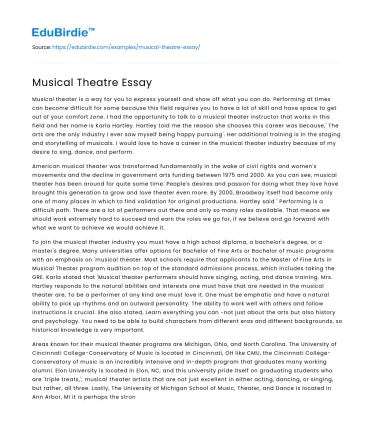Introduction
Musical theatre represents a unique and dynamic form of art that combines music, song, dance, and acting to convey a story. Its evolution over the centuries has mirrored cultural shifts and societal changes, offering audiences not only entertainment but also reflections on human experiences and emotions. From its origins in European opera and operetta to its current form, musical theatre has undergone significant transformations that have led to the diverse and vibrant productions seen today. The significance of musical theatre lies not only in its artistic innovation but also in its ability to address social issues, challenge norms, and bring awareness to diverse narratives. This essay endeavors to explore the evolution of musical theatre, its cultural impact, and the controversies that have shaped its development. Through examining these aspects, we gain a deeper understanding of how musical theatre continues to be a potent medium for storytelling and cultural expression.
The Historical Evolution of Musical Theatre
The roots of musical theatre can be traced back to ancient times, with forms such as the Greek chorus and Roman comedy, where music played a crucial role in storytelling. However, the modern iteration of musical theatre began to take shape in the 19th century with the emergence of operettas by composers like Gilbert and Sullivan, who introduced light-hearted, satirical productions. In the early 20th century, the American musical theatre scene began to flourish with the advent of Broadway, which became synonymous with high-quality theatrical performances.
Save your time!
We can take care of your essay
- Proper editing and formatting
- Free revision, title page, and bibliography
- Flexible prices and money-back guarantee
One pivotal moment in the evolution of musical theatre was the integration of jazz and blues into stage productions, a trend that gained momentum in the 1920s. This era saw the rise of the "Golden Age" of musicals, characterized by productions like "Oklahoma!" and "West Side Story," which blended traditional musical elements with innovative storytelling techniques. Stephen Sondheim, often credited with revolutionizing the genre, introduced complex characters and intricate musical compositions that challenged audiences and expanded the scope of musical theatre.
As the 20th century progressed, musical theatre continued to evolve, with influences from rock music, hip-hop, and other contemporary genres shaping new productions. Shows like "Rent" and "Hamilton" exemplify the genre's adaptability and its ability to resonate with modern audiences while addressing contemporary themes. These productions not only highlight the historical evolution of musical theatre but also underscore its capacity to reflect and influence cultural trends. Despite its rich history, some critics argue that musical theatre can at times rely too heavily on spectacle over substance, a point worth considering in its ongoing evolution.
The Cultural Impact and Social Commentary of Musical Theatre
Musical theatre has long served as a platform for social commentary, using its unique blend of music and narrative to address pressing societal issues. Productions like "Cabaret" and "Les Misérables" exemplify how musical theatre can bring historical and political issues to the forefront of public consciousness. "Cabaret," set against the backdrop of pre-World War II Germany, explores themes of freedom, oppression, and moral ambiguity, prompting audiences to reflect on their own societal values.
Moreover, musical theatre has been instrumental in highlighting issues of race, gender, and identity. "The Color Purple" and "Avenue Q" tackle topics such as racial discrimination and LGBTQ+ issues, challenging audiences to confront biases and embrace diversity. By presenting these topics within an engaging format, musical theatre not only entertains but also educates and inspires change. This impact is reinforced by the words of theatre critic Ben Brantley, who remarked, "Musicals have the power to change the way we see the world and ourselves."
Nevertheless, the depiction of controversial themes in musical theatre is not without its detractors. Some argue that certain productions oversimplify complex issues or fail to adequately represent marginalized voices. Critics contend that while musical theatre has the potential to provoke thought and dialogue, it also risks reinforcing stereotypes or perpetuating outdated narratives. Despite these criticisms, the genre's ability to initiate conversations around important social issues remains one of its most powerful attributes.
The Future of Musical Theatre: Innovation and Challenges
As musical theatre continues to evolve, it faces the dual challenges of staying relevant in an increasingly digital world while preserving its rich tradition. The advent of streaming platforms and the global reach of social media have transformed how audiences engage with musical theatre, providing new opportunities for innovation and outreach. Productions like "Dear Evan Hansen" have embraced technology by incorporating digital elements into their narratives, reflecting the interconnectedness of modern society.
Furthermore, the rise of immersive theatre experiences and interactive performances has pushed the boundaries of traditional stagecraft, inviting audiences to become active participants in the storytelling process. This trend towards experiential theatre has the potential to redefine the relationship between performers and audiences, creating more intimate and impactful experiences. However, this shift also presents challenges, particularly in terms of accessibility and authenticity.
As the industry navigates these changes, it must also address ongoing issues of diversity and representation. The call for more inclusive casting and the creation of original works that reflect diverse perspectives are essential for the continued growth and relevance of musical theatre. By embracing these challenges and opportunities, musical theatre can continue to captivate audiences and remain a vital force in the cultural landscape.
Conclusion
In conclusion, musical theatre stands as a testament to the enduring power of storytelling through performance. Its rich history, cultural impact, and ongoing evolution highlight its significance as both an art form and a medium for social change. While it faces challenges related to representation and modernization, the genre's ability to adapt and innovate ensures its continued relevance in the ever-changing landscape of entertainment. As musical theatre progresses, it remains poised to inspire, provoke, and entertain audiences around the world, reminding us of the universal human experiences that connect us all.






 Stuck on your essay?
Stuck on your essay?

